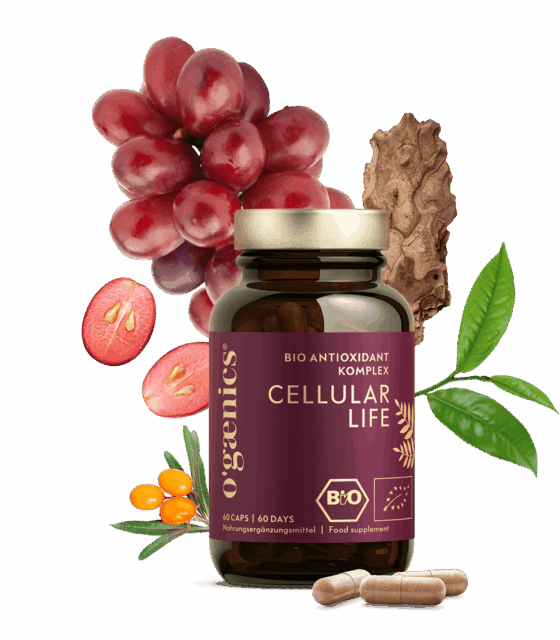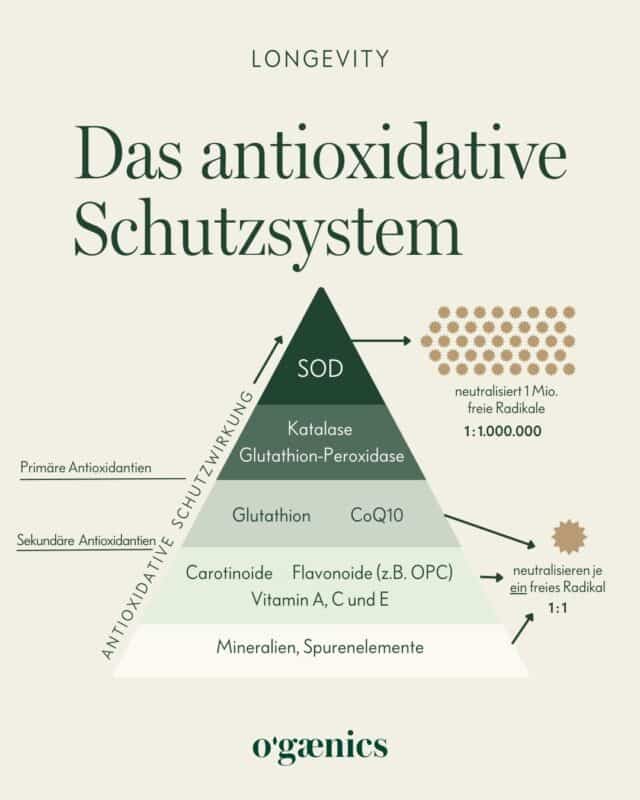The biological age of your cells and the associated cell protection are decisive factors when it comes to the ageing process. Although ageing is a natural part of life, the condition of your cells can be positively influenced through targeted measures.
Numerous studies have shown that biological age – the actual age of cells – often does not correspond to chronological age. While genetics play a role, factors such as diet, exercise and stress management account for the majority. In fact, these lifestyle factors influence around 80 % of cell age.
In this article you will find out how you can slow down the biological ageing of your cells and strengthen cell protection.
Chronological vs. biological age
Chronological age is simply the number of years that have passed since you were born – it’s the number on your passport that you celebrate when you celebrate your birthday.
Biological age, on the other hand, refers to the condition of your cells and your body. It reflects how “old” your cells really are and how well they function.
While chronological age is fixed, biological age can be strongly influenced by lifestyle factors such as diet, exercise and stress. You can therefore be biologically younger or older than your date of birth suggests.
Why do cells age?
Cell ageing is a complex process that is controlled by a variety of internal and external influences. Over time, cells lose their efficiency in dealing with daily stresses such as environmental toxins, oxidative stress and natural wear and tear.
This process is known as cellular senescence – a stage in which cells no longer function normally and no longer provide effective cell protection. However, there are ways to slow down this process and positively influence the biological age of your cells.
The main causes of cell ageing and the breakdown of cell protection are:
- Free radicals and oxidative stress: These molecules attack cell structures such as DNA and proteins, leading to functional disorders and accelerated ageing. Strong cell protection can neutralize free radicals and thus protect the cells.
- Chronic inflammation: Persistent inflammation in the body damages cells and weakens cell protection. An anti-inflammatory diet can counteract this process and reduce the biological age of your cells.
- Shortened telomeres: With each cell cycle, the end pieces of the chromosomes, the so-called telomeres, shorten. If they are too short, the cell ceases to function or dies. Effective cell protection can slow down this process.
- Mitochondrial dysfunction: Mitochondria are the power plants of the cells. Over time, their efficiency decreases, which accelerates cell ageing and the breakdown of cell protection.
Genetics and lifestyle – What influences biological age?
Interestingly, genetic factors have only a minor influence on biological age. Around 20 % of cell protection is determined by genes, which means that you can influence 80 % through your lifestyle.
The biological age of your cells is therefore not set in stone. You can actively reduce it through healthy habits and thus slow down the ageing process. These include:
- Whole foods and antioxidants: An anti-inflammatory diet with berries, nuts and green leafy vegetables provides important antioxidants that neutralize free radicals and reduce the biological age of your cells.
- Avoid processed foods: Sugar and processed foods cause oxidative stress and weaken cell protection. A natural diet and avoiding sugar and using healthier sugar alternatives, on the other hand, protects your cells.
- Stress managementStress weakens cell protection. You can positively influence your biological age with stress reduction techniques such as meditation or yoga.
- Regular exercise: Exercise promotes cell metabolism and supports cell regeneration, which reduces biological age.
- Get enough sleepYour cells regenerate during the sleep phase. Sufficient sleep is therefore crucial to strengthen cell protection.
The influence of lifestyle on biological age
A healthy lifestyle is not only crucial for protection against chronic diseases, but also has a direct impact on the biological age of your cells. Regular exercise, a healthy diet and effective stress management can strengthen the mitochondria and thus slow down biological ageing.
Your entire body also follows a natural schedule: The Chinese organ clock shows you when your organs are most active and how you can tailor your routines – from nutrition to regeneration – even better to them
Antioxidants are the key here. They neutralize free radicals and prevent them from damaging your cells. An anti-inflammatory diet and dietary supplements such as the Cellular Life Antioxidant Complex from Ogaenics can effectively support cell protection and rejuvenate the biological age of your cells.
The building blocks of your cells and their influence on biological age
Our cells consist of several components, all of which make a decisive contribution to cell protection and the control of biological ageing:
- Cell nucleus: The nucleus is the control center of the cell.
- Mitochondria: These convert nutrients into energy and play a central role in cell protection.
- Golgi apparatus: Packages and transports proteins.
- Endoplasmic reticulum: Produces and processes proteins and lipids.
- Ribosomes: Produce vital proteins that promote cell protection.
- Lysosomes: Break down waste products and support cell protection.
Oxidative stress can disrupt these processes and thus accelerate the biological ageing of your cells. Effective cell protection is therefore essential to preserve the health of your cells.
Cellular Life – Your key to a new biological age
-
Bestseller
Cellular Life
Certified organic cell protection complex with nature's most powerful antioxidants69,90 €1.815,58 € / kg
The Cellular Life product from Ogaenics was developed to influence the biological age of your cells and support cell protection. It contains a combination of the most powerful plant antioxidants, vitamins and minerals that support natural cell protection.
The main components include:
- CyanthOx™: A patented sea buckthorn extract, rich in OPC, which strengthens cell protection.
- Grap’inside®: An organic grape seed extract that neutralizes free radicals.
- Holimel®: A melon extract with SOD activity that strengthens the body’s own cell protection.
- Vitamin C from Amla extract: Protects the cells and promotes collagen formation.
The pyramid of the antioxidant protection system
The body’s antioxidant protection system can be visualized as a pyramid, with each level playing a crucial role in cell protection.
- Primary antioxidants such as superoxide dismutase (SOD) neutralize millions of free radicals and thus protect cell structures.
- Secondary antioxidants: Substances such as glutathione recycle used antioxidants and ensure continuous cell protection.
- Nutrients and plant antioxidants: Substances such as vitamin C and OPC act directly at the cellular level and slow down the biological ageing of your cells.
Cellular Life comprehensively supports this antioxidant system and helps to strengthen cell protection and reduce the biological ageing of cells.
Conclusion – Protect your cells and influence your biological age
By adopting a healthy lifestyle and using targeted supplements such as Cellular Life, you can slow down the biological ageing of your cells. Strong cell protection is crucial to slow down the ageing process of cells and maintain their health. The better you protect your cells, the younger you can be.
If you want to delve even deeper into how you can activate your cells via central enzymes such as AMPK and SIRT1 and thus specifically boost your metabolism and cell regeneration, we recommend this article: How to boost your metabolism naturally.
Store The Story
-
Bestseller
Cellular Life
Certified organic cell protection complex with nature's most powerful antioxidants69,90 €1.815,58 € / kg
- Wang, X., Yan, X., Zhang, J. et al. Associations of healthy eating patterns with biological aging: national health and nutrition examination survey (NHANES) 1999-2018. Nutr J 23, 112 (2024). https://doi.org/10.1186/s12937-024-01017-0
- Aline Thomas, Daniel W Belsky, Yian Gu, Healthy Lifestyle Behaviors and Biological Aging in the U.S. National Health and Nutrition Examination Surveys 1999-2018, The Journals of Gerontology: Series A, Volume 78, Issue 9, September 2023, Pages 1535-1542, https://doi.org/10.1093/gerona/glad082
-
Kim, K., Zheng, Y., Joyce, B.T. et al. Relative contributions of six lifestyle- and health-related exposures to epigenetic aging: the Coronary Artery Risk Development in Young Adults (CARDIA) Study. Clin Epigenet 14, 85 (2022). https://doi.org/10.1186/s13148-022-01304-9
-
Sarkhosh-Khorasani, S., Sangsefidi, Z.S. & Hosseinzadeh, M. The effect of grape products containing polyphenols on oxidative stress: a systematic review and meta-analysis of randomized clinical trials. Nutr J 20, 25 (2021). https://doi.org/10.1186/s12937-021-00686-5
- Nie, F.; Liu, L.; Cui, J.; Zhao, Y.; Zhang, D.; Zhou, D.; Wu, J.; Li, B.; Wang, T.; Li, M.; et al. Oligomeric Proanthocyanidins: An Updated Review of Their Natural Sources, Synthesis, and Potentials. Antioxidants 2023, 12, 1004. https://doi.org/10.3390/antiox12051004
- Ananga, Anthony, et al. “Grape Seed Nutraceuticals for Disease Prevention: Current Status and Future Prospects”. Phenolic Compounds – Biological Activity, InTech, 8 Mar. 2017. Crossref, doi:10.5772/66894.
- Xiong, Li-Gui et al. “Epigallocatechin-3-gallate promotes healthy lifespan through mitohormesis during early-to-mid adulthood in Caenorhabditis elegans.” Redox biology vol. 14 (2018): 305-315. doi:10.1016/j.redox.2017.09.019
- Rohit Sharma, Ravi Kumar, Anamika Sharma, Abhishek Goel, Yogendra Padwad, Long-term consumption of green tea EGCG enhances murine health span by mitigating multiple aspects of cellular senescence in mitotic and post-mitotic tissues, gut dysbiosis, and immunosenescence,
The Journal of Nutritional Biochemistry, Volume 107, 2022, 109068, ISSN 0955-2863, https://doi.org/10.1016/j.jnutbio.2022.109068. - Rohit Sharma, Bhawna Diwan, An update on healthspan and lifespan enhancing attributes of tea amidst the emerging understanding of aging biology, Human Nutrition & Metabolism, Volume 28, 2022, 200149, ISSN 2666-1497, https://doi.org/10.1016/j.hnm.2022.200149.
- Warner, H R. “Superoxide dismutase, aging, and degenerative disease.” Free radical biology & medicine vol. 17,3 (1994): 249-58. doi:10.1016/0891-5849(94)90080-9
- C. Tatone, M.C. Carbone, S. Falone, P. Aimola, A. Giardinelli, D. Caserta, R. Marci, A. Pandolfi, A.M. Ragnelli, F. Amicarelli, Age-dependent changes in the expression of superoxide dismutases and catalase are associated with ultrastructural modifications in human granulosa cells, Molecular Human Reproduction, Volume 12, Issue 11, November 2006, Pages 655-660, https://doi.org/10.1093/molehr/gal080
- Grau-Bové, Carme et al. “A Ten-Day Grape Seed Procyanidin Treatment Prevents Certain Ageing Processes in Female Rats over the Long Term.” Nutrients vol. 12,12 3647. 27 Nov. 2020, doi:10.3390/nu12123647
- Peng, Cheng, , , , , , , , , , , , Biology of Ageing and Role of Dietary Antioxidants, BioMed Research International, 2014, 831841, 13 pages, 2014. https://doi.org/10.1155/2014/831841







 No products in the cart.
No products in the cart.